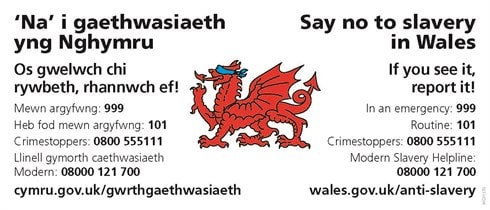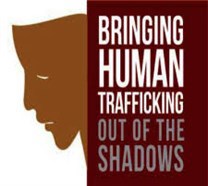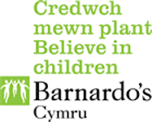
What is modern day slavery?
Modern Day Slavery, also known as contemporary slavery, refers to slavery that continues to exist in the present day.
Types of Slavery
- Slavery by descent – Where people are born into slavery.
- Bonded labour – also referred to as debt bondage, when people become indebted to others and are forced to work in order to pay off the unrealistic debt. People are often forced to work far past the original debt that they owed. Often working under the force of threats and abuse, people are rendered helpless.
- Forced labour - any work undertaken against a persons will, with the threat of some sort of punishment if the work is not carried out. Forced migrant labour and sex slavery are examples of this.
- Human Trafficking – the recruiting and transportation of people for the purpose of exploitation with violence, threats and coercive methods used.
- Early or forced marriage - when someone enters into a marriage against their will. Child marriages would be considered slavery for the majority of cases.
- Child slavery – Not to be confused with child labour, child slavery is when a child is exploited for someone else’s gain. Can include child trafficking, marriage and domestic slavery.
Signs to look out for?
Slavery is often hard to identify, but there are some signs to look out for. Someone in slavery may:
- Have their movements restricted – no identification documents or little opportunity to move freely.
- Look neglected – over crowded, poor conditions, can lead to a victim appearing malnourished, injured or poorly clothed.
- Lack personal belongings
- Mistrust others – victims may have been told to avoid speaking to other people and may fear the consequences if they do.
- Be unable to produce identifying documents such as passports – victims may have had these taken from them in an attempt to stop them from escaping.
- Limited family contact
What to do if you suspect that someone is a victim of slavery or are a victim yourself?
The most important thing to do if you are a victim of slavery or suspect that someone else is, is to report it.
Helplines
- In an Emergency: 999
- Routine/non-emergency: 101
- Crimestoppers: 0800 555111
- Modern Day Slavery Helpline: 08000 121 700
IF YOU HAVE CONCERNS ABOUT A CHILD - Click here.
IF YOU HAVE CONCERNS ABOUT AN ADULT - Click here.
What help is available for me as a survivor of slavery?
In Wales there are organisations that can provide specialist support if you are a survivor of slavery.
Care Pathways and Bawso provide support to those aged 18 and over whilst Barnardos provide support of you are under 18 years of age.
Providing you with the right care, at the right time, for you
A ‘Care Pathway’ is in place for anyone who is suspected of being a survivor of slavery in Wales. The Pathway ensures the right support is provided to you, depending on your needs. This includes health services, those provided by local authorities and specialist services as required.
In Wales, the main specialist services are:
Bawso - Diogel Project

Bawso support workers work with survivors to create individual support plans, which can include financial help, support accessing health services and treatment, specialist counselling, criminal and immigration-related legal advice, education and employment opportunities and other support as needed.
Bawso provide accommodation for men and women as part of their support. They can also work on an outreach basis with those who do not require accommodation.
If you need help you can contact an Advice Worker on 029 20644633 or 0800 7318147.
New Pathways - Liberate Project

If you require support call 01633 250205 and ask to speak to a human trafficking worker.

Barnardo’s provides support for children ( those under 18 years of age) who have been subject to slavery. A child survivor will be given a support worker who is trained and understands that child victims of trafficking are particularly vulnerable and need support specific to their needs.
If you are under 18, a survivor of slavery and need help then call the Modern Slavery Helpline on 0800 0121700.
What has the United Kingdom done to tackle Modern Day Slavery?
In 2015 the United Kingdom put into place the Modern Day Slavery Act 2015.
What does the Act Mean?
Large commercial organisations are now required by law to publish, each financial year, a human trafficking and slavery statement in regard to their supply chains.
Resources
Wales Modern Slavery Safeguarding Pathway
Other helpful links

Call 08000 121 700 to get help, report a suspicion or seek advice

Anti-slavery international works to end slavery throughout the world.

Bawso is an All Wales voluntary organisation, providing specialist services to victims and BME people affected by, or at risk of, Domestic Abuse and all forms of violence, including forced marriage and human trafficking.

ECPAT UK is a leading children’s rights organisation working to protect children from child trafficking and transnational child exploitation.
Independent Child Trafficking Guardians Service Leaflet
Independent Child Trafficking Guardians Service Referral Form
What you can do if you suspect care workers are being exploited